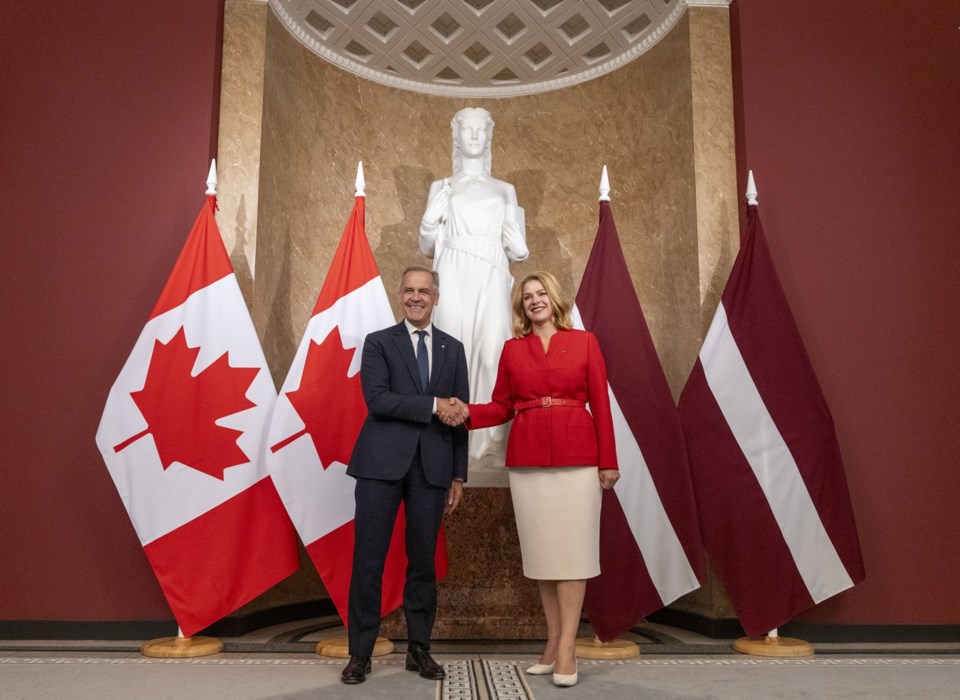RIGA — Canada will keep troops in Latvia for another three years as part of a mission to deter further Russian aggression in Europe, Prime Minister Mark Carney said on Tuesday.
"We must deter and fortify. And that is the way that we can provide true reassurance," Carney said at a Tuesday news conference in Riga, flanked by Latvian Prime Minister Evika Silina.
Carney's office says there are now 2,000 Canadian Armed Forces troops in Latvia as part of Operation Reassurance, which is Canada’s largest overseas mission. Canadian troops have led a multinational battle brigade in Latvia since 2017, to impose what analysts call a "trip wire" that prevents Russia from invading Baltic countries.
The current authority for the mission ends in March 2026, but Carney says he plans to extend that until 2029.
"We will, in the process, increase the brigade's capabilities here in Latvia, reinforce our collective defence, strengthen our co-operative security, and keep the NATO presence strong," Carney said.
Carleton University professor Stephen Saideman said Canada co-ordinates the role of soldiers from multiple countries to shore up the Latvia's defences and to train its soldiers.
"We're punching above our weight," he said in an interview. "We're basically being treated by the rest of NATO as equal to the U.K. and Germany," who are co-ordinating similar multinational brigades in Estonia and Lithuania respectively.
Ottawa aims to have a full cadre of 2,200 persistently deployed Canadian troops in Latvia sometime in 2026. Saideman said that number is currently only reached during specific exercises. Canada has been building new infrastructure at the Adazi base near Riga in the past two years to make up for overcrowding.
He said Carney's visit is likely meant "to help educate Canadians about this major commitment" and to put a face on the boost to defence spending that is coming the expense of other services for Canadians.
"He might be going there to show to Canada where the money is going, and why the money is necessary," he said.
Saideman added that the mission is particularly complex as France had originally been expected to lead and staff Adazi, with Ottawa instead taking on the complicated work of co-ordinating smaller contingents from many countries.
"We are doing a whole lot that doesn't necessarily get recognized back in Canada," he said.
Silina said Canadians can be proud of their role at the Adazi base, calling it "a great achievement" that Canada is co-ordinating the work of multiple countries. "Our co-operation is excellent," she said in Latvian, through an interpreter.
Canada lists 13 European nations among those in the Latvian brigade.
The mission started after Russia's 2014 invasion of Ukraine and annexation of Crimea and has taken on increased importance since Moscow's February 2022 full-scale invasion of Ukraine.
Earlier Tuesday, Carney said in Berlin that Russian President Vladimir Putin is afraid to sit down with Ukrainian President Volodymyr Zelenskyy. U.S. President Donald Trump, who hosted both Putin and Zelenskyy in separate meetings earlier this month, said the two should talk directly on how to end the war.
"We see President Putin putting conditions and conditions, and stalling and stalling, and being afraid of having this meeting," Carney said.
Carney also said increased defence spending across NATO is meant to shore up the transatlantic alliance's capacity for "deploying resources to a variety of theatres," to face threats not only in Europe but also in the Arctic.
"It's a reshaping of how we defend ourselves," he said.
Marcus Kolga, a senior fellow with the Macdonald-Laurier Institute, said Canada's mission in Latvia is a major contribution.
"It's probably one of the most important international missions that we've been engaged in since the liberation of the Netherlands in World War II," he said.
"It allows them to go on living their lives normally, even though that threat is right at their doorstep," he said, adding this applies to Latvians as well as neighbouring Estonians and Lithuanians.
"It demonstrates that Canada is active, and it won't be pushed around by Vladimir Putin," he said.
Global Affairs Canada's profile on Latvia says both countries "share a close relationship grounded in shared fundamental values, such as support for democracy, human rights and the rules-based international order."
Silina said Canada is an economic partner, citing the example of Air Baltic flying jets with relatively less environmental impact that were made in Canada by Bombardier.
"We want to co-operate in drone construction, food processing as well as hydrogen energy," she said, adding defence companies also want to work with their Canadian counterparts.
Latvia has deep scars over violence meted out on the population both during the Nazi occupation and during Latvia's time as part of the Soviet Union.
— With files from Dylan Robertson in Ottawa
This report by The Canadian Press was first published Aug. 26, 2025.
Craig Lord, The Canadian Press



